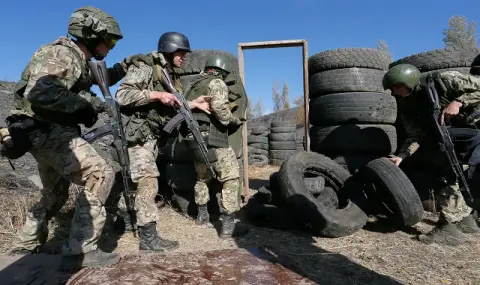Russian forces are concentrating forces of an unspecified number in the western Belgorod region near the border with Ukraine, presumably to pin down and draw Ukrainian forces into the area and to prepare for offensive operations aimed at expanding the Russian frontline in the international border area in northeastern Ukraine.
This is stated in the daily analysis of the Institute for the Study of War (ISW).
The Graivoron - Borisovka - Proletarsky area will offer Russian forces opportunities for offensive operations south in the direction of Zolokhov and Bohodukhov - two Ukrainian cities northwest of Kharkiv, 25 km from the international border, or west in the direction of the settlements along highway P-45, which connects Bohodukhov with the city of Sumy. Russian forces could conduct offensive operations in one or both directions simultaneously, and the Russian concentration here could be intended to force Ukrainian forces to commit manpower and materiel across a wider stretch of the border in Kharkiv and Sumy Oblasts.
Russian forces are also concentrating limited forces in Kursk and Bryansk Oblasts near the border with Sumy Oblast, and even the limited concentration in these areas may be intended to achieve the likely desired effect of further attracting and pinning Ukrainian forces in the area of international border.
Russian forces are currently bringing the Northern Force Group in the International Border Area to a planned final composition and are likely to conduct only limited offensive operations along the Sumi-Kharkov axis for now. But even limited Russian offensive operations in these areas will increase the pressure, which will stretch Ukrainian manpower and materiel over a wider front, and will likely allow Russian forces to establish tactical strongholds in support of follow-up operations northwest of
Western officials continue to publicly debate Ukraine's right to use Western-supplied weapons to strike military targets in Russia.
This comes amid Russian efforts to persuade the West to continue with self-imposed restrictions and split NATO unity.
Ukraine-based open source organization Frontelligence Insight reported that the Russian cruise missile manufacturer "Raduga" has been able to circumvent US sanctions and import Western and Chinese equipment since 2022. Frontelligence analyzed documents that the group "Ukrainian cyber resistance" managed, and from them she found out that in the plan for technical modernization and reconstruction of "Rainbow" for 2023, equipment from Italian, German and Chinese companies is indicated. Frontelligence said other documents show that "Rainbow" has successfully completed some of these plans on time, suggesting that some of the foreign equipment has been purchased. Frontelligence noted that it is still unclear whether "Rainbow" purchased this equipment from third parties or countries, but in some cases it is more likely that she worked directly with the company.
In 2024, Russia's Defense Industrial Base (DIB) will reportedly produce three times as many artillery shells as the West will, although Russian shells reportedly suffer from quality control problems and Ukrainian artillery is - exact from Russian.
Kremlin officials continue to indicate that Russia is not interested in meaningful negotiations with Ukraine and encourage Kremlin information operations aimed at forcing the West to make concessions on Ukraine's sovereign territory and people.
>On May 26, the Speaker of the Russian State Duma, Vyacheslav Volodin, said that Ukrainian President Volodymyr Zelensky had violated the Ukrainian constitution by "cancelling" the elections, and is no longer the legitimate leader of Ukraine. Volodin claims that because of this, Zelensky has no right to make official decisions, including announcing mobilization. Volodin's thesis is that in 2014, Ukraine "ceased to exist as a legal state" and that "all agreements with an illegitimate president are void and may be challenged in the future". Volodin's statements are consistent with many of the Kremlin's long-standing narratives about Ukrainian electoral law and Ukraine's legitimacy over the past decade. On May 24, Putin also said that Ukraine's parliament and constitutional court should study the Ukrainian constitution to determine the legality of officials who remain in office after their announced terms expire.
Russian forces have recently confirmed their progress near Svatove, Avdeevka and the city of Donetsk.
It is reported that the former fighters of the group "Wagner" continue to form new units under the leadership of Rosgvardiya and the Chechen Spetsnaz "Akhmat".
A Russian internal source claims that a former commander of the group "Wagner" with call name "Zombies" hopes to recruit around 3,500 former "Wagner" for the newly formed volunteer intelligence-assault brigade "Vostok" under the leadership of Rosgvardiya. The inside source also claims that in the squad "Camerton" under the leadership of the Chechen special forces "Akhmat" there are about 1,000 ex-Wagner fighters. Another Russian source claimed that an unspecified source refuted some of these initial claims and that Zombie would not be able to recruit 3,500 personnel for the "Vostok" brigade. and that in the "Camerton" there are no more than 150 former Wagner fighters, but it "died as a combat unit", forcing its personnel to transfer to the newly formed "Chestnut" detachment.
